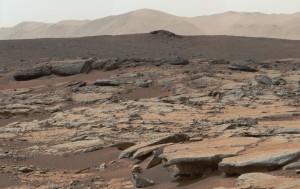Vegetables for a Red Planet?
That is the prognosis of a study by plant ecologist Wieger Wamelink of Wageningen UR – a university and research center in The Netherlands that focuses specifically on the theme “healthy food and living environment.”
The soil on Mars may be suitable for cultivating food crops, Wamelink reports, and he is convinced that a complete food
cultivation system for Mars is achievable within a decade.
In a unique pilot experiment, the plant ecologist tested the growth of 14 plant varieties on artificial Mars soil over 50 days.
Making use of NASA-composed soil based on the volcanic soil of Hawaii, to his surprise, the plants grew well. Some even blossomed.
“I had expected the germination process to work, but I thought the plants would die due to a lack of nutrients,” Wamelink explains. The soil analysis showed that Mars soil contains more nutrients than expected. In addition to phosphorus and iron oxides, the scientist found nitrogen, an essential plant nutrient.
Controlled cultivation
Leo Marcelis of Wageningen University is an advisor to the ‘Mars One’ project and one of Wamelink’s colleagues. He is looking into
cultivation systems that should make growing vegetables on Mars possible.
“As it is impossible to take everything from Earth, we will need to produce food if we want to go into space. This requires
knowledge on cultivation systems that function well in Mars conditions,” says Marcelis in a university press statement.
On Mars, plants would be cultivated in enclosed plant growth facilities – possibly equipped with LED lamps. But which color is
best for plant growth and where would the electricity come from?
“In addition to controlled cultivation systems, complete recycling will also be essential on Mars,” Marcelis adds.
Research into the cultivation of plants in difficult conditions is not only relevant to future inhabitants of Mars, but also to those
who wish to remain on our blue planet Earth.
Mars-Earth connection
Wamelink said that Mars soil consists of volcanic rock. “If we learn to bring it into cultivation, we can use the knowledge to
cultivate crops on difficult soils here on Earth.”
Insights into a more effective recycling of water, gas and nutrients and the closing of cycles are also possible. The development
of high-tech automated and optimized cultivation systems, sensors that continuously monitor the needs of plants, and plant cultivation in low light conditions are also an important spin-off of the project.
Wamelink said that knowledge of complete controllable cultivation systems, plant varieties related to soils, food security, and entomology for bee pollination are research areas in which the university is already engaged.
“So if we are asked to develop cultivation systems for Mars, we can make a flying start,” Wamelink said.
By Leonard David

